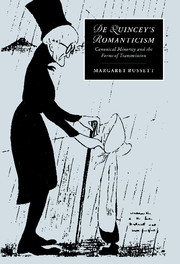Book contents
- Frontmatter
- Contents
- Acknowledgments
- List of abbreviations
- Introduction
- 1 Conversions: Wordsworth's gothic interpreter
- 2 Transmissions: composing The Convention of Cintra
- 3 Impersonations: the magazinist as minor author
- 4 Reproductions: opium, prostitution, and poetry
- 5 Appropriations: the counter-lives of the poet
- Epilogue: minor Romanticism
- Notes
- Index
- CAMBRIDGE STUDIES IN ROMANTICISM
2 - Transmissions: composing The Convention of Cintra
Published online by Cambridge University Press: 26 October 2011
- Frontmatter
- Contents
- Acknowledgments
- List of abbreviations
- Introduction
- 1 Conversions: Wordsworth's gothic interpreter
- 2 Transmissions: composing The Convention of Cintra
- 3 Impersonations: the magazinist as minor author
- 4 Reproductions: opium, prostitution, and poetry
- 5 Appropriations: the counter-lives of the poet
- Epilogue: minor Romanticism
- Notes
- Index
- CAMBRIDGE STUDIES IN ROMANTICISM
Summary
TIDINGS
De Quincey attended Oxford during the middle years of the Napoleonic Wars, “at [the] height,” as he recalls, of “the superstition in respect to the French military prowess … so dishonouring” (M 3:107) to his compatriots. He was himself at the height of his infatuation with Wordsworth, having briefly visited Grasmere in 1807. Keeping the minimal “short term” at Worcester College, he spent most of his university career in transit; in the fall of 1808 he finally fled, just on the eve of his baccalaureate examinations. Much later, in “The English Mail-Coach” (1849), he was to evoke this period in terms that connected his frequent travel with the “awful political mission” then occupying the country.
The mail-coaches it was that distributed over the face of the land, like the opening of apocalyptic vials, the heart-shaking news of Trafalgar, of Salamanca, of Vittoria, of Waterloo … The victories of England in this stupendous contest rose of themselves as natural Te Deums to heaven; and it was felt by the thoughtful that such victories, at such a crisis of general prostration, were not more beneficial to ourselves than finally to France, and to the nations of western and central Europe, through whose pusillanimity it was that the French dominion had prospered. […]
- Type
- Chapter
- Information
- De Quincey's RomanticismCanonical Minority and the Forms of Transmission, pp. 52 - 91Publisher: Cambridge University PressPrint publication year: 1997



